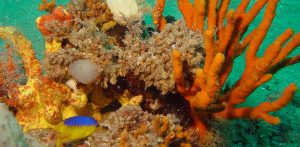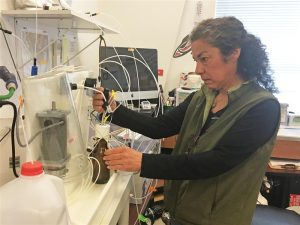Seagrasses, like eelgrass, may help mitigate the negative effects of ocean acidification. Photo credit: California Sea Grant
The negative impacts of ocean acidification on ocean life are well documented, and research efforts are shifting towards mitigation. One recommendation is to include the use of seagrass meadows as “OA refugia” due to their potential to buffer waters and sequester carbon. With funding from California Sea Grant, UC Davis researchers documented the pH, alkalinity and other properties of seawater in Tomales Bay, a major shellfish-growing center in the state. Their results showed seagrass beds may reduce or raise seawater acidity depending on biomass and season, and organisms within the beds experience higher variation between nighttime and daytime acidity levels. This research has been communicated to California legislators, the CA Ocean Protection Council, and the CA Secretary of Natural Resources, including specifically addressing ocean acidification legislation currently in consideration (SB 1363 and AB 2139). Additionally, the state of California is considering significant commitments to seagrass restoration based in part on this project.


